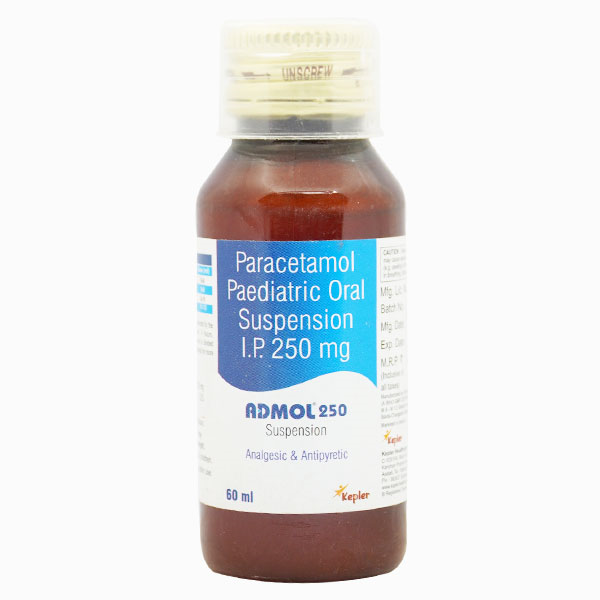Description
About Admol 250 Oral Suspension
Admol 250 Oral Suspension is a non-steroidal anti-inflammatory drug (NSAID) used in relieving pain and fever. Pain can be acute (temporary) or chronic (long-lasting). Acute pain is a short time pain caused by damage to the tissues of the muscle, bone, or other organs. Chronic pain lasts for a long duration and is caused due to pathologies like nerve damage, etc. This medicine helps relieve symptoms of muscle pain and dental pain in children. Fever is a high body temperature followed by shivering, headache, and, in severe cases, delirium.
Admol 250 Oral Suspension contains Paracetamol which belongs to the antipyretic and analgesic class of drugs. Paracetamol works by blocking the production of a chemical messenger (prostaglandin) and encouraging heat loss (through sweating), which helps reset the hypothalamus thermostat.
Admol 250 Oral Suspension may cause certain side effects such as abdominal pain, cold-like symptoms, or diarrhoea. These side effects do not require medical attention and gradually resolve over time. However, if the side effects persist or worsen, please consult your paediatrician. Admol 250 Oral Suspension should be used as advised by your doctor. Do not give the child more than the prescribed dose of Admol 250 Oral Suspension. Admol 250 Oral Suspension can be given with or without food. Your paediatrician will decide the dose of the medicine depending upon the type and severity of the condition.
Admol 250 Oral Suspension is intended for pediatric use only. Avoid giving Admol 250 Oral Suspension to your child if she/he is allergic to it. Keep your doctor informed about your child’s health condition, medications, and medical history to rule out any side effects/interactions. If your child has liver and kidney disease, inform your doctor before using this medicine. Admol 250 Oral Suspension is used in babies below two years of age.
Uses of Admol 250 Oral Suspension
Medicinal Benefits
Admol 250 Oral Suspension contains Paracetamol as an active ingredient (antipyretic and analgesic). Paracetamol lowers the elevated body temperature and mild pain by inhibiting the synthesis of a chemical messenger (prostaglandin) and promoting heat loss (through sweating) that helps reset the hypothalamic thermostat.
Directions for Use
Storage
Side Effects of Admol 250 Oral Suspension
- Nausea
- Diarrhoea
- Abdominal pain
- Indigestion
Drug Warnings
Avoid giving Admol 250 Oral Suspension to your child if she/he is allergic to it. Keep your doctor informed about your child’s health condition, medications, and medical history to rule out any side effects/interactions. If your child has liver and kidney disease, inform your doctor before using this medicine. Admol 250 Oral Suspension is used in babies below two years of age. Admol 250 Oral Suspension is intended for pediatric use only. Hence avoid using it in adults and other population.
Drug Interactions
Drug-Drug Interactions: Admol 250 Oral Suspension has interactions with antibiotics (azithromycin, erythromycin), anti-fungal (ketoconazole), and anti-viral or anti-HIV drugs (ritonavir).
Drug-Food Interactions: No interactions found/established.
Drug-Disease Interactions: Inform your doctor before administering Admol 250 Oral Suspension if your child has any kidney or liver disease history.
Drug-Drug Interactions Checker List
- AZITHROMYCIN
- KETOCONAZOLE
- ERYTHROMYCIN
- RITONAVIR
Habit Forming
Diet & Lifestyle Advise
- The child’s immune system is affected by stress raising the risk of being sick. Hence try progressive muscle relaxation techniques to relieve stress.
- Sleeping for 7-9 hours each night can make your child stay fit and safe.
- Make your child drink more fluids to avoid dehydration.
Special Advise
- Admol 250 Oral Suspension may interact with antibiotics like Azithromycin and erythromycin. Hence, please maintain a gap of at least 1 hour between the administration of Admol 250 Oral Suspension and antibiotics.
Disease/Condition Glossary
Pain: Pain can be short-term (acute) or long-term (chronic). Acute pain is caused by damage to the tissues of the muscle, bone, or organs and lasts for a short time. In contrast, chronic pain lasts for a longer duration. It is caused due to pathologies like nerve damage, osteoarthritis, and dental pain due to damage to the tooth nerve, infection, decay, extraction, or injury.
Fever: Fever is not a disease but a sign that the body is trying to fight an infection or illness in which the body’s immune system gets activated to fight infections caused by bacteria or viruses. A normal temperature is around 98.6 F but may vary from person to person. Fever is caused due to the ‘pyrogen’ released by the hypothalamus part of the brain. This pyrogen causes heat-generating effects to match a new higher temperature set point to fight infection.






Reviews
There are no reviews yet.